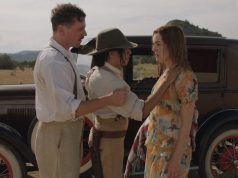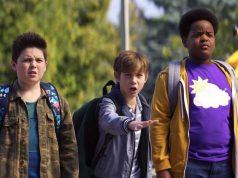In 2003, Drew Carey led a group of comedians on a USO tour of the newly liberated Iraq, entertaining the troops like Bob Hope used to do. Among the comics was Jeffrey Ross, who brought along his camcorder and thought the resulting footage might make for an entertaining and/or informative movie. Turns out he was right.
With nothing more than this home-movie footage and some narration, Ross has created a film that’s both stirringly patriotic and screamingly funny. Only a few minutes of the guys’ onstage acts are presented; the bulk of the film is behind the scenes as Ross, Carey and their fellow comedians meet soldiers, hear harrowing stories, and crack jokes about the war-torn areas they visit. Humor is how people deal with tragedy, after all, and it’s genuinely touching to see how delighted the troops are to have some entertainment, not to mention the effect it has on the performers themselves.
Ross is known for his scathing appearances at the Friars Club celebrity roasts. (“Drew Carey is to comedy what Mariah Carey is to comedy,” he once said. He is also fond of making references to Bea Arthur’s penis.) He’s a shlubby, ordinary-looking guy who maintains a persona typical of many modern comedians: deadpan and cynical. He admits that while he’s always admired what Bob Hope did for the troops, he’d never done anything patriotic himself. He had never even voted.
Then the USO opportunity comes up and his friend Larry Gelbart, a veteran comedy writer, gives Ross some advice: “You have to be a standup person before you can be a standup comedian.” Do something worthwhile, he says. Go to Iraq and entertain the troops.
Ross and the others are humbled and awestruck to see the aftermath of the war — this was after Baghdad was liberated but before Saddam was captured — and often frightened by the violence and destruction that surrounds them. You can tell that a comedian has been blindsided by the true weight of a situation when he can’t come up with a joke to crack. There are several such moments here.
There are plenty of moments where the jokes do come, too, where Ross and his compatriots — all regular Americans who, whatever their attitude toward Bush’s Iraq policies, are grateful for the military men and women who are doing the tough jobs — riff on one another, on the wretched living conditions, on the things they normally make jokes about. Like “The Aristocrats,” “Patriot Act” often derives laughs simply by letting comedians hang out together and crack each other up.
One of the performers is Blake Clark, an Army veteran who fought in Vietnam and now works as a comedian and actor. He has a grizzled, familiar-looking face; you’ve seen him before. His reaction to the Iraq trip is different from the others’ because he’s seen war before. He gets choked up while flying over some of the hard-hit areas, then in other scenes makes jokes, as when he visits an Army mess hall and says, “This is where I fought some of my toughest battles.”
But the overarching story is Ross’ personal development as a citizen. By the end his perspective has changed, and the film has a hopeful, positive message about the soldiers, and even somewhat about the war effort itself. Ross said in a Q&A following a screening of the film in Austin that he has since embarked on additional USO tours, and that yes, he now votes. So there is some good news coming out of Iraq these days.
A- (1 hr., 15 min.; )





